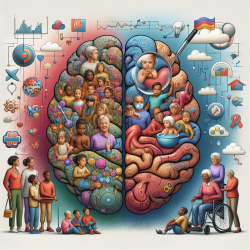Introduction
Autism is a lifelong neurodevelopmental condition that presents unique challenges and opportunities across the lifespan. With increasing numbers of autistic individuals reaching older adulthood, it becomes imperative for practitioners to understand the nuances of aging within this population. A recent narrative review titled "Aging Well and Autism: A Narrative Review and Recommendations for Future Research" offers valuable insights into the aging process for autistic adults and highlights areas where further research and practical interventions are needed.
The Four-Domain Model of Aging Well
The review utilizes Fernández-Ballesteros’ four-domain model of "aging well," which includes:
- Health and Functioning
- Cognitive and Physical Functioning
- Positive Affect and Control
- Social Participation and Engagement
These domains provide a comprehensive framework to assess and support successful aging in autistic adults. The findings indicate that autistic older adults often face challenges such as increased medical conditions, cognitive decline, mental health issues, and reduced social participation.
Health and Functioning
Autistic adults are at a higher risk for co-occurring medical conditions, including cardiovascular and neurological diseases. Practitioners should focus on early intervention and consistent healthcare management to mitigate these risks. Encouraging lifestyle changes such as improved diet, regular exercise, and better sleep hygiene can contribute to better health outcomes.
Cognitive and Physical Functioning
There is an elevated risk of cognitive decline in autistic adults, often occurring earlier than in the general population. Practitioners should consider cognitive assessments and interventions tailored to the needs of autistic adults. Physical activity is crucial in maintaining cognitive and physical health, and programs should be adapted to accommodate the unique needs of autistic individuals.
Positive Affect and Control
Mental health conditions such as anxiety and depression are prevalent among autistic adults, affecting their quality of life. Therapeutic interventions, including cognitive-behavioral therapy and mindfulness, can be beneficial. Practitioners should also focus on enhancing life satisfaction and coping skills to improve overall well-being.
Social Participation and Engagement
Social isolation and loneliness are significant concerns for autistic adults. Encouraging community participation and building social networks are essential strategies. Practitioners can facilitate social engagement through structured programs and support groups that foster meaningful interactions.
Recommendations for Practitioners
Practitioners are encouraged to integrate these findings into their practice by:
- Implementing comprehensive health assessments and personalized care plans.
- Encouraging lifestyle modifications to improve health and cognitive outcomes.
- Utilizing therapeutic interventions to address mental health challenges.
- Promoting social engagement and community participation.
By focusing on these areas, practitioners can significantly improve the quality of life for autistic adults as they age.
Conclusion
Understanding the aging process in autistic adults is crucial for developing effective interventions and support systems. Practitioners should leverage the insights from the "Aging Well and Autism" review to enhance their practice and contribute to better outcomes for this population. Continued research and collaboration are essential to address the complex needs of aging autistic individuals.
To read the original research paper, please follow this link: Aging Well and Autism: A Narrative Review and Recommendations for Future Research.










